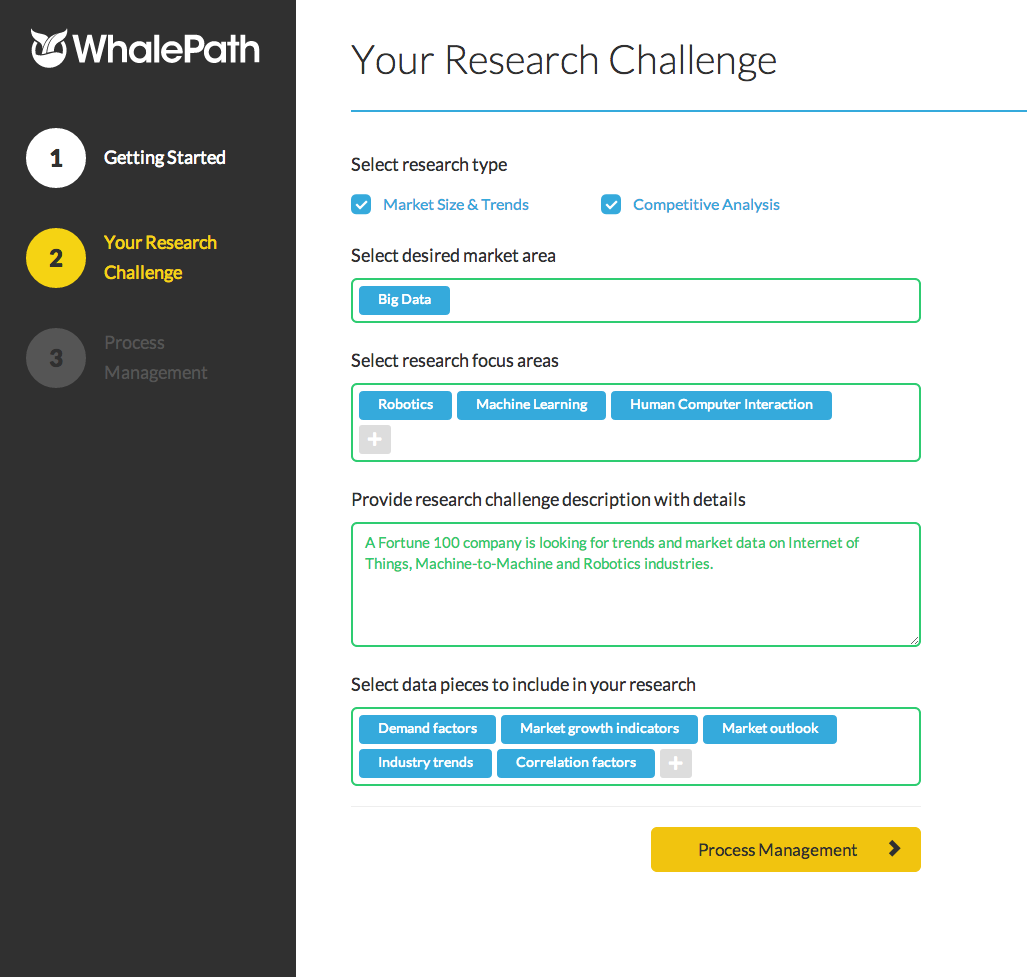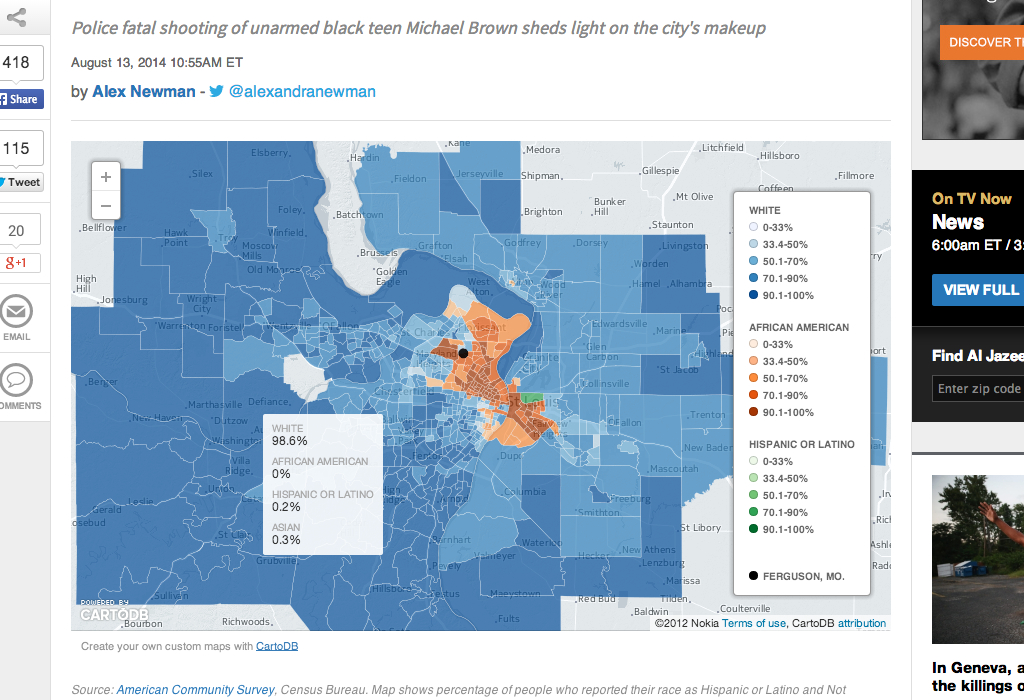 A Q&A with Whale Path co-founder Artem Gassan. The San Francisco-based startup, which offers an on-demand competitive research platform for enterprises, announced the closing of a $1.1 million Seed funding round at the start of September. Investors include TMT Investments, Kima Ventures, 500 Startups, Altair Capital, FundersClub, Wefunder and Ben Narasin. It was founded in 2012 by Gassan and Colin Gu, and this is the first significant outside funding round for the company. It is a past participant in both the Founder Institute and 500 Startups accelerators.
A Q&A with Whale Path co-founder Artem Gassan. The San Francisco-based startup, which offers an on-demand competitive research platform for enterprises, announced the closing of a $1.1 million Seed funding round at the start of September. Investors include TMT Investments, Kima Ventures, 500 Startups, Altair Capital, FundersClub, Wefunder and Ben Narasin. It was founded in 2012 by Gassan and Colin Gu, and this is the first significant outside funding round for the company. It is a past participant in both the Founder Institute and 500 Startups accelerators.
SUB: Please describe Whale Path and your primary innovation.
Gassan: Our on-demand platform delivers custom business research three times faster and at about half the price offered by leading research vendors. Corporations can order custom research on key business decision points like market sizing and competitive analysis. Most research challenges are completed in seven-to-14 days.
Our patent-pending technology is scalable because it modularizes data points for reuse across multiple custom research reports. We plan to enhance our platform to perform predictive and causative quantitative analysis with artificial intelligence and natural language processing.
SUB: Who are your target markets and users?
Gassan: Whale Path targets manager- and director-level executives from corporations in the IT, financial and energy sectors. Our customers are primarily director- and partner-level business development, product management, innovation, and strategy executives in the computer software, information technology, and energy sectors. They need to do market and trend analysis to explore a new sector for expansion or make more informed decisions about a product. For example, they might need answers to very specific questions supported by specific data points. This helps them to make important business decisions, and they want it fast, on-demand. Often they don’t have the budget to pay for expensive reports from Gartner or Forrester.
SUB: Who do you consider to be your competition, and what differentiates Whale Path from the competition?
Gassan: Traditional business research firms such as Gartner and Forrester are too expensive, poorly customized and take too long to produce reports. Directors and managers often don’t have the data they need to make the best decisions. Without that data they waste time and resources making suboptimal decisions that could have been avoided. The best research from Gartner and Forrester is mostly available to top corporate executives of Fortune 1000 companies. Those reports are also not customized, meaning clients often don’t get the data they need or aren’t getting the most up-to-date information.
SUB: You just announced that you’ve raised $1.1 million in Seed funding. Why was this a particularly good time to raise funding?
Gassan: We have met the main goals that we established when started the company a year-and-a-half ago. This positioned us as a fundable company. We have also significant traction that validates our business model. We were at the point when capital was of an essence to accelerate our growth.
SUB: How do you plan to use the funds, and do you have plans to seek additional outside funding in the near future?
Gassan: We are continuing to enhance our current product by adding new features, streamlining the process, and polishing UI/UX.
We will also be investing in an additional key sales executive who is very experienced in the research industry, and increasing our marketing, PR, and promotional budget.
We plan to raise Series A in about six-to-eight months.
SUB: What was the inspiration behind the idea for Whale Path? Was there an ‘aha’ moment, or was the idea more gradual in developing?
Gassan: When I was conducting business research, I spent tons of time researching market trends and doing competitive analysis. I had access to Gartner and Forrester. They were extremely expensive and their generic reports were not always up-to-date, which meant that in fast-moving industries they lacked important data I needed. In my previous startups, I was always worried that I didn’t have access to the exact data I needed to make the best decisions. Often that meant finding research I couldn’t locate on my own, but there was no service that could do that for me at a reasonable price.
I founded Whale Path with Colin to create the product I was looking for.
SUB: What were the first steps you took in establishing the company?
Gassan: We first formed a solid team of founders who all shared the same passion for research and technology. We came up with our big idea and have had multiple pivots for the business to become what it is today.
We entered the Founder Institute, the largest and well-recognized startup accelerator, followed by 500 Startups, to learn best practices for creating a successful early-stage company and to get guidance from experienced mentors.
We assembled a strong team of advisors that included leaders in the research field, education and technology.
SUB: How did you come up with the name? What is the story or meaning behind it?
Gassan: The whale is the largest mammal on earth and is very powerful. Our company’s vision is to be that whale for the business research space. The whale’s path is the road to the exact right data and knowledge in the ocean of information overload.
We came up with several similar names at first, and then surveyed our customers and business network. ‘Whale Path’ won the dominant majority of votes.
SUB: What have the most significant challenges been so far to building the company?
Gassan: The main challenge has always been to create a product that not only works and is liked by customers, but that is also scalable and unique.
SUB: How do you generate revenue or plan to generate revenue?
Gassan: Whale Path uses a ‘research challenge’ format to fulfill orders for custom research. Customers request research by launching a challenge and setting a price range for each data point as well as a maximum price for the entire project. Multiple analysts then perform research and upload data points and analysis to the platform. Whale Path removes duplicates and reviews all the data points for accuracy and validity. Customers receive multiple data point submissions and pay based on the accuracy and value each data point presents to them. Customers review all the analysts’ responses and grant kudos with additional payments for sourcing most valuable and relevant data. Analysts who receive the most kudos gain access to future projects with higher payouts.
SUB: What are your goals for Whale Path over the next year or so?
Gassan: Whale Path’s mission is to make business research mainstream and available on-demand for organizations of all sizes and budgets.















